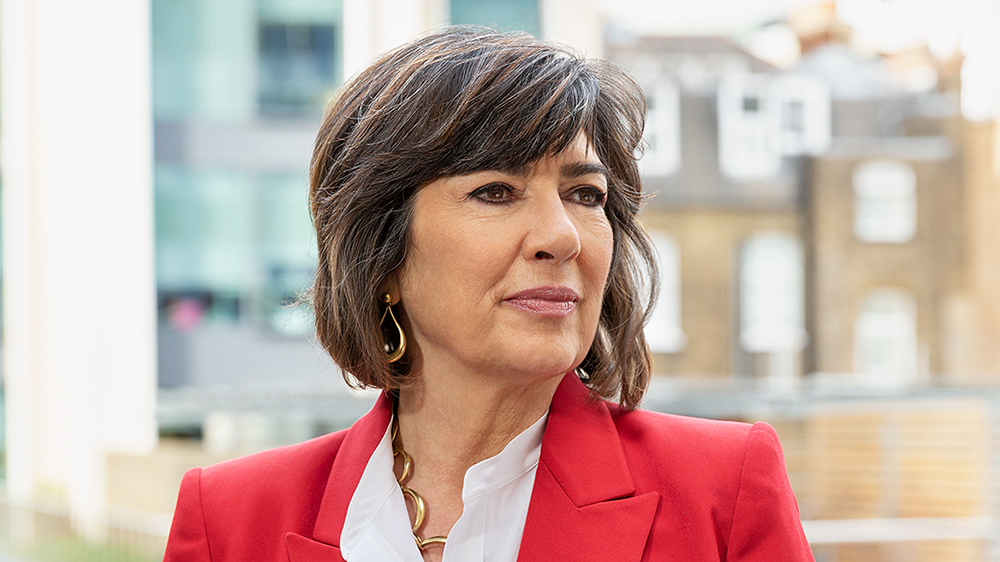Health
CNN’s Christiane Amanpour diagnosed with ovarian cancer

Veteran Cable News Network (CNN) reporter, Christiane Amanpour, is undergoing a round of chemotherapy after being diagnosed with ovarian cancer.
In a message to viewers, Amanpour said the past four weeks, during which she had not appeared on CNN’s international outlets, had been “a roller coaster” for her and announced her diagnosis.
“During that time, like millions of women around the world, I have been diagnosed with ovarian cancer,” she said, adding, “I’ve had successful major surgery to remove it and I’m now undergoing several months of chemotherapy for the very best possible long-term prognosis.”
Amanpour, who is based in London, said she was grateful to have health insurance through work and “incredible doctors in a country underpinned by of course the brilliant NHS.”
“I’m telling you this in the interest of transparency,” she said. “But in truth really mostly as a shout out to early diagnosis. To urge women to educate themselves on this disease to get all the regular screenings and scans that you can, to always listen to your body, and of course, to ensure your legitimate medical concerns are not dismissed or diminished.”
Amanpour hosts the network’s flagship international affairs programme. She has worked for the network since 1983.
Amanpour, 63, has been a longtime news figure at CNN, almost from its launch in the early 1980s.
She worked there from 1983 to 2010, then left for a brief stint at ABC News, where she anchored This Week.
She returned to CNN in 2012. Bianna Golodryga has filled in for Amanpour on her CNN International show as she went through surgery and treatments.
Health
NUFBTE Workers Occupy NAFDAC Lagos Office Over Sachet Alcohol Ban

NUFBTE Workers Occupy NAFDAC Lagos Office Over Sachet Alcohol Ban
Members of the National Union of Food, Beverage and Tobacco Employees (NUFBTE) on Thursday staged a protest at the NAFDAC office in Isolo, Lagos, demanding the reversal of the agency’s ban on sachet and PET-bottled alcoholic beverages. The union claims the ban contradicts a directive reportedly issued by the Federal Government, and they want production lines that were sealed to be immediately reopened.
The protesters, including manufacturers, distributors, and industry workers, argued that the enforcement of the ban threatens jobs, livelihoods, and the operations of small and medium-sized enterprises that rely on sachet alcohol sales. During the demonstration, union members handed a petition to NAFDAC officials, urging dialogue and a more balanced approach that safeguards both public health and the food and beverage sector.
NUFBTE cited alleged instructions from the Office of the Secretary to the Government of the Federation and the Office of the National Security Adviser, claiming that NAFDAC should suspend enforcement. The union said continued closure of production lines and restriction of alcohol sales would lead to economic hardship and widespread job losses.
READ ALSO:
- Naira Could Trade Below ₦1,000/$ With Dangote Refinery at Full Capacity — Otedola
- Adeyanju Urges EFCC, DSS to Probe El-Rufai Over Alleged Corruption, Insecurity in Kaduna
- Granite-Laden Truck Kills Motorist, Leaves Wife Critically Injured in Lekki–Ajah Crash
However, NAFDAC rejected the claims, with Director-General Prof. Mojisola Adeyeye stating that no federal directive has instructed the agency to halt the ban. In a statement, the regulator described circulating reports as “false” and “misleading,” emphasizing that its actions are within statutory authority and in line with official government policies.
“NAFDAC has not received any formal directive to suspend its regulatory or enforcement activities concerning sachet alcohol,” the statement read. The agency reiterated its commitment to public health protection, regulatory compliance, and consumer safety, warning the public and industry stakeholders to rely on verified information from official channels.
The ban, implemented earlier this month, targets alcoholic beverages packaged in sachets and containers smaller than 200ml, a measure aimed at reducing unregulated alcohol consumption and protecting vulnerable groups. While the policy has faced backlash from workers and businesses, NAFDAC maintains that it is necessary for national health and safety.
The protest underscores the tension between regulatory enforcement and economic concerns, as workers continue to call for inclusive policymaking and engagement with industry stakeholders to mitigate the impact on jobs and local businesses.
NUFBTE Workers Occupy NAFDAC Lagos Office Over Sachet Alcohol Ban
Health
NAFDAC Clarifies: No Government Directive to Halt Sachet Alcohol Enforcement

NAFDAC Clarifies: No Government Directive to Halt Sachet Alcohol Enforcement
The National Agency for Food and Drug Administration and Control (NAFDAC) has dismissed reports claiming that the Federal Government ordered a suspension of its enforcement activities against sachet alcohol and 200ml PET bottle alcoholic beverages, describing the reports as “false and misleading.”
In a statement signed by its Director-General, Prof. Mojisola Adeyeye, the agency clarified that it has not received any formal communication from the Federal Government instructing it to halt regulatory or enforcement operations. NAFDAC stressed that all its actions are carried out within its statutory mandate and guided by existing laws and official government directives.
“The said publication is false, misleading, and does not reflect any official communication received by the Agency from the Federal Government,” the statement read. Prof. Adeyeye reiterated that enforcement of regulations on sachet alcohol remains active and any changes to national regulatory policies would be officially communicated through authorised channels.
READ ALSO:
- Suspected IED Explosion Rocks Bayelsa Secretariat, Police Arrest Suspect
- Regina Daniels Shares Emotional Message on Children’s Welfare Amid Custody Battle
- Electricity Workers Serve 21-Day Nationwide Strike Notice to FG
NAFDAC warned that the spread of unverified information can cause public confusion, economic uncertainty, and misinterpretation of government policy. The agency urged the public, industry stakeholders, and the media to rely only on verified information released via its official platforms and government communication channels.
The clarification comes amid ongoing concerns over the public health risks of sachet alcohol, which has been associated with poisoning incidents and misuse, particularly among young people. NAFDAC reiterated its commitment to protecting public health, ensuring compliance in the food and beverage sector, and maintaining national interest while carrying out its regulatory duties.
The agency’s statement underscores that all enforcement operations targeting unsafe alcohol products will continue without interruption, aiming to safeguard consumers and uphold public safety.
NAFDAC Clarifies: No Government Directive to Halt Sachet Alcohol Enforcement
Health
FG Ends ‘No Work, No Pay’, Clears January Salaries After 84-Day JOHESU Strike

FG Ends ‘No Work, No Pay’, Clears January Salaries After 84-Day JOHESU Strike
The Federal Government has officially lifted the “No Work, No Pay” directive imposed during the 84-day nationwide strike by the Joint Health Sector Unions (JOHESU) and approved the immediate payment of January 2026 salaries for all affected health workers.
The decision followed the suspension of the industrial action after a successful conciliation meeting between the Federal Government and JOHESU leadership, prompting the union to direct its members nationwide to resume work in the interest of patients, health system stability, and national public health security.
In a statement issued by the Assistant Director, Press and Public Relations of the Federal Ministry of Health and Social Welfare, Ado Bako, the Minister of State for Health, Dr. Iziaq Adekunle Salako, said the resolution reflects the government’s commitment to dialogue, fairness, and the protection of Nigeria’s health workforce.
READ ALSO:
- Former NAHCON Chief Explains Why He Stepped Down, Denies Conflicts
- Fubara Reaffirms Commitment to Wike’s Vision
- Housing Crisis: ₦1.5m Rent vs ₦70k Minimum Wage Sparks Outcry in Nigeria
“The Federal Government remains fully committed to the welfare, dignity, and professional advancement of all health workers across Nigeria. This resolution demonstrates that dialogue, mutual respect, and good faith remain the most effective tools for resolving industrial disputes in our health sector,” Salako said.
The minister acknowledged the sacrifices made by health workers during the prolonged strike and assured JOHESU members that no worker would be victimised, sanctioned, or intimidated for participating in the action.
“Government has therefore approved the immediate payment of January 2026 salaries and assures all JOHESU members that no reprisal will follow the industrial action,” he added.
Salako further reaffirmed the administration’s commitment to sustained engagement with health sector unions, noting that discussions would continue on the Collective Bargaining Agreement (CBA) and outstanding issues relating to the adjustment of the Consolidated Health Salary Structure (CONHESS).
He disclosed that the Federal Government has committed to making provisions for the proposed salary adjustments in the 2026 Appropriation Act, in line with the recommendations of the existing technical committee template.
“The inclusion of salary adjustment provisions in the 2026 budget framework reflects our seriousness about achieving sustainable solutions for the health workforce through concrete policy and budgetary actions,” the minister stated.
He commended the spirit of cooperation and patriotism displayed by all parties throughout the negotiation process and reassured Nigerians of the government’s commitment to uninterrupted, quality, and accessible healthcare services nationwide.
FG Ends ‘No Work, No Pay’, Clears January Salaries After 84-Day JOHESU Strike
-

 metro2 days ago
metro2 days agoIKEDC Sets Feb 20 Deadline for Customers to Submit Valid IDs or Face Disconnection
-

 Education2 days ago
Education2 days agoSupreme Court Affirms Muslim Students’ Right to Worship at Rivers State University
-

 metro2 days ago
metro2 days agoLagos Police Launch Manhunt for Suspect in Brutal Ajah Murder
-

 News2 days ago
News2 days agoAso Rock Goes Solar as Tinubu Orders National Grid Disconnection
-

 Business3 days ago
Business3 days agoNaira Could Trade Below ₦1,000/$ With Dangote Refinery at Full Capacity — Otedola
-

 metro2 days ago
metro2 days agoArmy University Professor Dies in Boko Haram Captivity After Nearly One Year
-

 International2 days ago
International2 days agoTrump Halts Minnesota Immigration Crackdown After Fatal Shootings, Protests
-

 Politics3 days ago
Politics3 days agoCity Boy Movement Receives Bus Donations from Zenco, Obi Cubana for Tinubu’s Campaign















